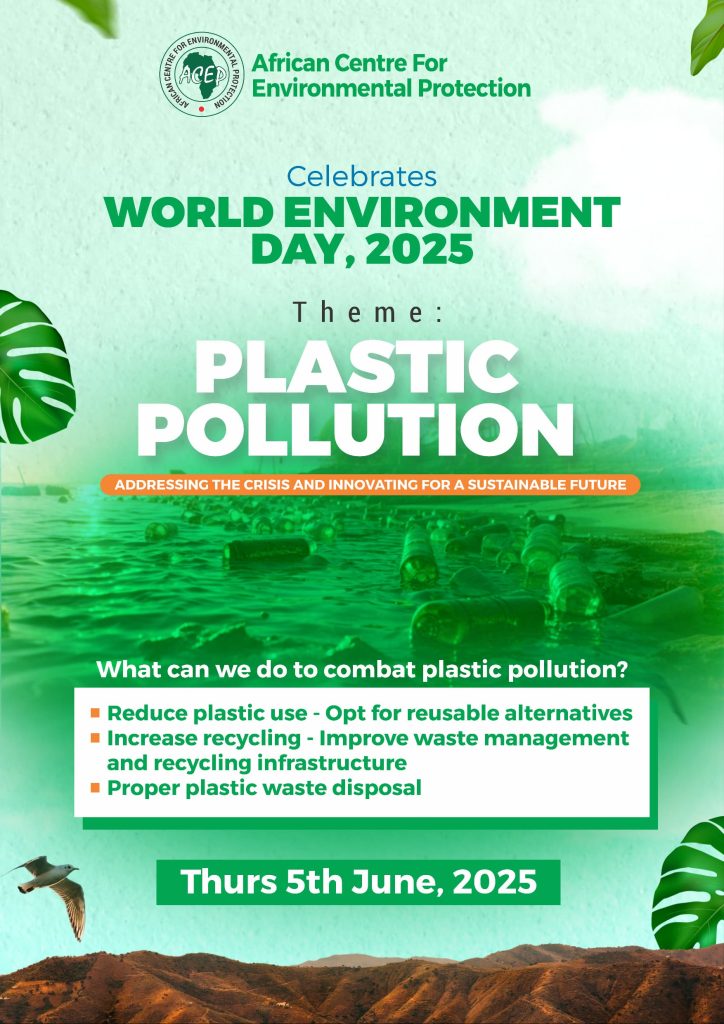
Addressing Plastic Pollution: A Call to Action for a Sustainable Future
The African Centre For Environmental Protection (ACEP) is proud to celebrate World Environment Day 2025, focusing on the critical theme of Plastic Pollution: Addressing the Crisis and Innovating for a Sustainable Future. This global observance on Thursday, June 5th, 2025, serves as a crucial reminder of the urgent need to tackle the pervasive issue of plastic waste and its devastating impact on our planet.
The Pervasive Crisis of Plastic Pollution
Plastic has become an indispensable part of modern life due to its versatility and durability. However, the very qualities that make it useful also make it a persistent environmental threat. Billions of tons of plastic waste have accumulated in landfills, oceans, and natural environments, leading to widespread pollution. This crisis manifests in several ways:
Environmental Degradation: Plastic debris chokes marine life, pollutes soil, and contaminates water sources. Microplastics, tiny fragments of plastic, are now found everywhere, from the deepest oceans to the air we breathe, and even within the human body.
Biodiversity Loss: Animals often mistake plastic for food, leading to internal injuries, starvation, and death. Entanglement in plastic debris also poses a significant threat to wildlife.
Health Concerns: The chemicals used in plastic production and those released as plastic breaks down can leach into the environment and food chain, posing potential risks to human health.
Innovating for a Sustainable Future
Addressing the plastic pollution crisis requires a multi-faceted approach that goes beyond traditional waste management. Innovation is key to developing sustainable alternatives, improving recycling processes, and creating a circular economy for plastics. This includes:
Bioplastics and Biodegradable Materials: Research and development into materials that can naturally decompose or are derived from renewable resources offer promising solutions.
Advanced Recycling Technologies: New technologies are emerging that can break down plastics into their chemical components, allowing for higher-quality recycling and the creation of new products.
Sustainable Product Design: Designing products with their end-of-life in mind, promoting reusability, and minimizing packaging are crucial steps.
What Can We Do to Combat Plastic Pollution?
While the challenge is immense, individual and collective actions can make a significant difference. The flyer highlights three key areas where we can all contribute:
Reduce Plastic Use – Opt for Reusable Alternatives: This is the most effective first step. By consciously choosing reusable bags, water bottles, coffee cups, and food containers, we can drastically cut down on single-use plastics. Supporting businesses that offer plastic-free options also sends a strong message.
Increase Recycling – Improve Waste Management and Recycling Infrastructure: Proper recycling diverts plastic from landfills and oceans, allowing it to be repurposed. It’s essential to understand local recycling guidelines and advocate for better waste management systems in our communities. Supporting initiatives that improve recycling infrastructure, especially in regions with limited facilities, is vital.
Proper Plastic Waste Disposal: For plastics that cannot be avoided or reused, responsible disposal is paramount. This means ensuring plastic waste is placed in designated bins, preventing it from escaping into the environment. Participating in clean-up drives and community initiatives also helps in managing existing waste.
A Call to Action
World Environment Day 2025 serves as a powerful reminder that the responsibility to protect our planet rests with all of us. By embracing the theme of “Plastic Pollution: Addressing the Crisis and Innovating for a Sustainable Future,” we can work together to reduce our plastic footprint, promote sustainable practices, and safeguard our environment for generations to come. Let’s commit to making conscious choices and advocating for systemic changes to create a cleaner, healthier world.

